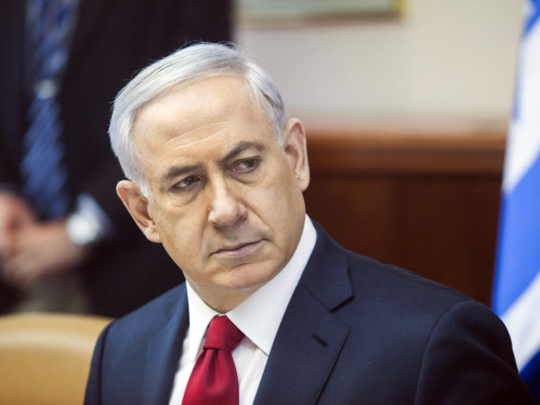
The continued audacity of Israeli Prime Minister Benjamin Netanyahu despite international condemnation of his merciless 50-day war against Gaza, which cost more than 2,100 Palestinian lives — many of them women and children — is deplorable. This is especially so considering the virtual silence of key western nations. Here is the highlight of his new response revealed on Monday after an Israeli cabinet meeting. He ordered a number of fresh harsh steps, including the demolition of the homes of Palestinian protesters, particularly in occupied East Jerusalem. This extreme response comes in the wake of a bill that was recently passed by the Israeli Knesset, which approves the imprisonment of Palestinian stone throwers for up to 20 years, including minors.
Netanyahu declared: “Those who protest against the state of Israel and in favour of the Palestinian state, I say to them, simply, go there, to the Palestinian [National] Authority or Gaza.” He added, “I promise you that the state of Israel will not make it difficult for you, but for those who stay here, we will make it difficult if you are a rioter or a terrorist.” But his shocking position was in sharp contrast to the Israeli people, a majority of whom preferred the renewal of peace talks with Palestinians in order to prevent additional riots and attacks by Palestinians in the Occupied Territories or in the predominantly Arab communities in northern Israel, or Galilee, as it is better known.
A November 3-5 poll, conducted by the Israel Democracy Institute and Tel Aviv University reportedly asked Israelis whether it was best to prevent further attacks by renewing diplomatic negotiations with the Palestinians or by ending them. Exactly 57.2 per cent of the general public (52.5 per cent among Jews and 81.2 per cent among Arabs) favoured renewed peace talks. Those favouring cancellation of contacts with the PNA comprised 28.5 per cent, including 33.19 per cent of Jews and 5.7 per cent of Arabs. In other words, Netanyahu’s cabinet, which includes several right-wing members who do not wish to accommodate Palestinians, does not represent the feelings of Israelis in general and their views must have come as a shock.
The headline in the Israeli liberal daily Haaretz on November 9 on the just-concluded American election said it was “time for American Jews to confront Israel’s demons”. It went on: “The same Jews who are sensitive to every minute slight against minorities in America are strangely deaf to the heaps of abuse hurled at Israel’s Arab minority on a daily basis, especially after the summer’s Gaza war. They scream bloody murder when the US government tries to stifle dissent, but manage to look the other way when basic freedoms are challenged in Israel. What’s good for the goose isn’t good for the gander, apparently, and while American Jews are quick to accuse the world of double standards, they are curiously blind to their own.”
The paper concluded that “American Jews should practice what they preach and demand that Israel be just as democratic, freedom-loving and respectful of minority rights as America is, or as they would want it to be”.
Coincidentally, a poll by the Ramallah-based Palestinian Centre for Public Opinion indicated there is more support on the Palestinian street for bilateral diplomatic moves. More than half (54.3 per cent) of the Palestinians support the two-state solution, while a little less than a third (31.3 per cent) oppose it.
What all this means is that Netanyahu has little choice, he either reshuffles his cabinet or resigns allowing new, reasonable elements to join the Israeli government. Otherwise, the Palestine poll reports that “half of the Palestinians anticipate a violent confrontation with Israel in the near future amid daily clashes and rising tensions in [occupied] Jerusalem”. Another trigger that may launch a serious conflict is in the report that Israeli soldiers have notified Palestinians of Israeli plans to confiscate 3,176 acres (12,852 dunums) around the West Bank village of Beit Iksa, which is close to occupied Jerusalem, for military purposes. The orders gave the Palestinian residents until the end of 2017 to leave the area. In 2009, Beit Iksa lost 20 dunums to the high-speed train project being built from occupied Jerusalem to Tel Aviv.
George S. Hishmeh is a Washington-based columnist. He can be contacted at ghishmeh@gulfnews.com







